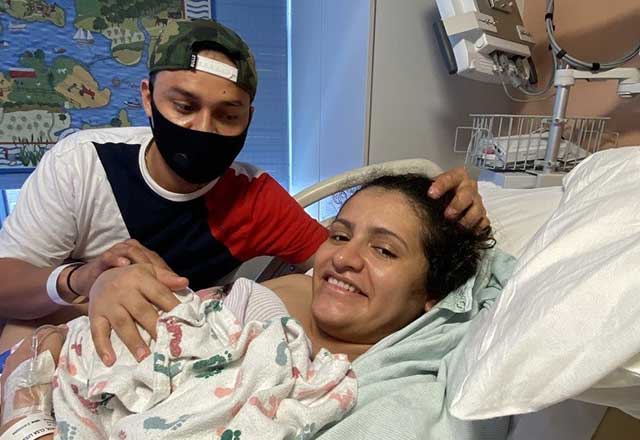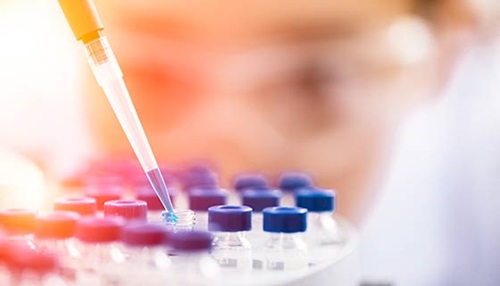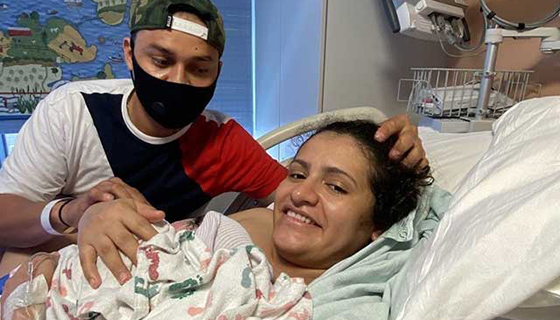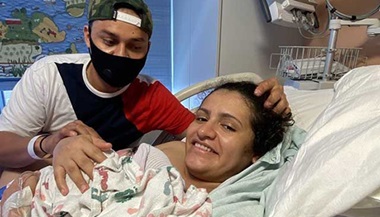Patient Story
Pregnancy and COVID-19: Elsa’s Story
Patient Story Highlights
- Elsa, four months pregnant with her first baby, became ill with COVID-19 and was treated at The Johns Hopkins Hospital.
- A multidisciplinary team, including intensive care specialists and obstetricians such as Andrew Satin, M.D., cared for Elsa and her unborn baby.
- In August 2020, Elsa gave birth to a healthy baby girl.
When Elsa Reyes-Amaya learned she was pregnant in January 2020, she was surprised and happy. The healthy, 24-year-old and her partner, Victor, began the exciting journey of becoming first-time parents together.
Normal Pregnancy or Coronavirus Symptoms?
In late March, Elsa developed a headache. She started to run a slight fever and noticed some body aches. She called her doctor, who said it was probably due to her body experiencing pregnancy changes.
A little over a week later, Elsa had nausea, diarrhea and vomiting, and just a few days later, there was a new, troubling symptom: She was having difficulty catching her breath.
COVID-19 Pneumonia During Pregnancy
Victor took Elsa to a nearby hospital on April 13, where she was admitted. Four days later, her condition deteriorated. She developed pneumonia and was transferred to The Johns Hopkins Hospital.
“Ms. Reyes-Amaya came to the hospital in critical condition,” obstetrician Andrew Satin, M.D., says. “She was experiencing respiratory failure due to sudden, severe pneumonia.”
Elsa was also showing early signs of sepsis, a potentially deadly infection of the bloodstream that can occur in critically ill patients. Satin says that although her initial tests for COVID-19 were negative, further testing showed a positive result: Elsa had SARS-CoV-2, the coronavirus that causes COVID-19.
Elsa says she doesn’t remember much of what happened once she was at Johns Hopkins. But what she does recall makes her cry, especially when she thinks about the dangerous situation she and her unborn baby were in. “It’s still hard to talk about,” she says.
Elsa has no idea how she caught the coronavirus. She lives in the same home as Victor, his mother and his brother, none of whom came down with COVID-19.
Ventilator Treatment for COVID-19
Despite supportive care at Johns Hopkins, Elsa’s condition continued to worsen.
Satin explains that during pregnancy, normal changes affecting the lungs help an expectant woman take in and absorb more oxygen as she breathes for herself and her fetus. When pregnant women get pneumonia, these changes can make the illness more severe.
At first, Elsa was treated with extra oxygen, but it wasn’t enough. As her breathing became more difficult, she had to be placed on a ventilator. Her care team gave her medicine to put her in a deep sleep. Then, the team inserted a breathing tube into Elsa’s throat to push oxygen into her lungs and, essentially, breathe for her while she was unconscious.
Her awareness came and went. Like other patients hospitalized with COVID-19 in an intensive care unit (ICU), she experienced troubling nightmares. When she regained consciousness, she was still fearful, and it was only after calling family members that she knew the upsetting dreams were not real.
Turning a Corner and Shifting to Obstetric Care
At other moments, Elsa recalls hearing a calming, loving voice talking to her. “It was like a dream. I know I was asleep, but I felt like it was God talking to me,” she says.
Her family watched her progress from a necessary distance. (To protect patients and staff members from the coronavirus, Johns Hopkins hospitals do not allow visitors during the COVID-19 pandemic except in very limited, exceptional situations.)
The intensive care team removed Elsa’s breathing tube on May 5. “I was very surprised when I woke up. I thought I had been asleep for two days, but the nurse told me that I had been on a ventilator for more than two weeks.”
Satin and the rest of Elsa’s health care providers were excited, cautious and hopeful. Because COVID-19 is a new illness, its effects on unborn babies are still not clear.
“Once Elsa regained consciousness and realized she was out of danger from the coronavirus infection, she was eager to focus on her pregnancy,” Satin says. “We performed an ultrasound, and the first question Elsa asked was whether we could tell the sex of the baby. The nurse got tears in her eyes. It was very moving.”
Satin notes that his team, including most of the fellows and attending doctors in the Division of Maternal-Fetal Medicine, came to know Elsa.
Elsa was happy to be out of the worst danger and delighted to be expecting a little girl, but recovering from COVID-19 was tough. The disease had ransacked her body. She missed her family, and despite the encouraging ultrasound, she was concerned about her baby. “The doctors were telling me I would be fine, but I still felt afraid and stressed,” Elsa says. “They continued with so many tests. I prayed a lot, and asked God to protect my daughter.”
“All the doctors and nurses were wonderful with me,” Elsa says. “I felt protected. And I appreciated the doctors communicating with me and explaining what was happening.
“I wish I remembered the names of everyone who took care of me, but I do remember their faces.”
All the doctors and nurses were wonderful with me.
Surviving the Coronavirus
Elsa says her experience made her aware of how serious COVID-19 can be.
“Do not look at this disease as a game, because it’s terrible,” she says. “I’ve seen other people who go out and do not take precautions. I am not a doctor, but I do know that if we end up having to live with COVID-19 in our community, people will have to take care of themselves and their families and stay safe.”
Elsa says she had some lingering anxiety, even when she returned home to her family. “I was so afraid of getting sick again. But my baby gave me strength.”
A New Daughter and New Hope
On July 31, baby Sofia was born — a little early, a little small, but very lucky. “I was happy to be attending, so I could be there for Elsa when she gave birth,” Satin says. “We felt like it was a big save: both patients — Elsa and Sofia — and a family as well.”
Satin notes that while some patients with severe COVID-19 pneumonia do not survive, Elsa’s youth and lack of many risk factors improved her chances.
“This was an uplifting case,” Satin says. “Ms. Reyes’ ICU team deserves so much credit, not just for the happy outcome for her, her baby and her family, but also for all of us who were privileged to care for her.”
Elsa is thrilled to be a mom, and she says concentrating on her baby got her through her toughest moments. “Thank God, Sofia was OK,” she says. “She is an angel. I’m so proud of her.
“It was always about her.”
Learn more about coronavirus and maternal-fetal medicine.
Elsa's Obstetrician
Andrew J. Satin, M.D.

- Director of Gynecology and Obstetrics
- Dorothy Edwards Professor of the Department of Gynecology and Obstetrics






